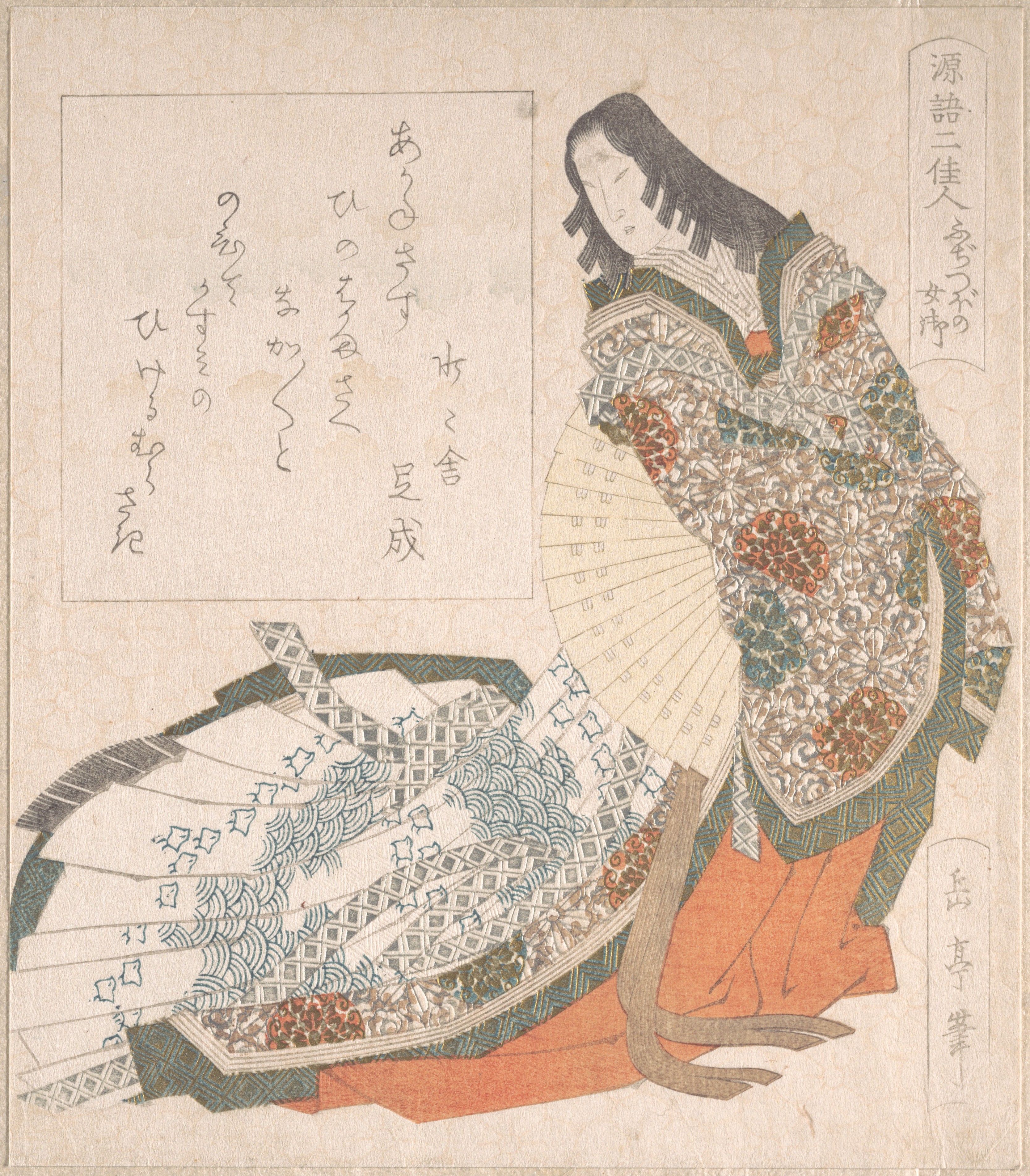Lady Fujitsubo on:
[Wikipedia]
[Google]
[Amazon]
 is a fictional character in
is a fictional character in
 is a fictional character in
is a fictional character in Murasaki Shikibu
was a Japanese novelist, poet and lady-in-waiting at the Imperial court in the Heian period. She is best known as the author of '' The Tale of Genji,'' widely considered to be one of the world's first novels, written in Japanese between abou ...
's '' The Tale of Genji'' ().
Biography
Daughter of a previous emperor and thus imperial princess, Fujitsubo enters the service of Kiritsubo Emperor at age 16, mainly because of her resemblance to the deceasedKiritsubo Consort
is a fictional character in '' The Tale of Genji'' ('' Genji Monogatari''). She is the mother of Genji. The Emperor favored her over all his other ladies, despite her relatively lower rank. He would stay with her longer than was generally cons ...
. She soon becomes an imperial favorite, but also Genji's childhood crush and later lifelong obsession. By chapter seven, it becomes obvious that Fujitsubo and Genji are already involved in an illicit love affair (although the author does not describe it, but rather implies the beginning of the relationship), the result of which is the birth of Reizei (the future emperor) whom everyone, except the two lovers, believes to be the son of the Kiritsubo Emperor.
Elevated to the rank of Empress and having her son named Heir Apparent (Reizei is supposed to succeed Suzaku), Fujitsubo gradually grows more and more troubled by guilt and the fear of having her secret exposed. Once Genji's advances intensify and, in the public realm, the faction of the Kokiden Lady comes to power, Fujitsubo's only countermeasure is to take vows and become a nun (). By this, she hopes on the one hand to permanently put Genji off and eliminate the risk of their affair being discovered and, on the other hand, to reassure Kokiden that she renounces any secular, political claims to power. After Genji's return from exile, she forms a political alliance with him and turns into a genuine "politically ambitious" figure in the tale. Only on her deathbed (in ) does she return to being a romantic heroine.
Reception and analysis
Fujitsubo's importance in the tale lies beyond her immediate contribution to the plot, in whatNorma Field
Norma M. Field is an author and emeritus professor of East Asian studies at the University of Chicago. She has taught Premodern Japanese Poetry and Prose, Premodern Japanese Language, and Gender Studies as relating to Japanese women.
Her areas o ...
termed as being an "original substitute": she makes her debut as a substitute for Kiritsubo, yet Genji will later look for substitutes for Fujitsubo in women such as Utsusemi, the Third Princess, and especially Murasaki
''Murasaki'' refers to the heroine of '' The Tale of Genji'' (), after whom the book's author, Murasaki Shikibu, was named by her contemporaries. She was a lady in waiting at the Imperial Court of Japan, around the year 1000. Murasaki Shikibu's ...
.
The adulterous affair between Fujitsubo and Genji is paralleled in , written by , in which the protagonist Sagoromo secretly violates a princess who gives birth to a son. In order to save the princess's reputation, the empress presents the child to the emperor as the empress's own. Later, when the emperor tries to abdicate in favour of this prince, an oracle identifies the prince's real father as Sagoromo and requires the emperor to cede him the throne instead.
The author of disapproved of the manner in which Genji ultimately becomes honorary retired emperor through his illicit tryst with Fujitsubo, and found the similar plot device in "utterly revolting and appalling." Several later readers of ''The Tale of Genji'' also found Genji and Fujitsubo's affair problematic. Jun'ichirō Tanizaki
was a Japanese author who is considered to be one of the most prominent figures in modern Japanese literature. The tone and subject matter of his work ranges from shocking depictions of sexuality and destructive erotic obsessions to subtle por ...
's first translation of ''Genji'', produced in the 1930s with the supervision of the ultranationalist Yoshio Yamada, cut out the affair between Genji and Fujitsubo entirely so as to avoid offending Imperial Japan's State Shinto
was Imperial Japan's ideological use of the Japanese folk religion and traditions of Shinto. The state exercised control of shrine finances and training regimes for priests to strongly encourage Shinto practices that emphasized the Emperor as ...
ideology of an unbroken divine imperial lineage. This material was restored in Tanizaki's later translations published after the end of World War II
World War II or the Second World War, often abbreviated as WWII or WW2, was a world war that lasted from 1939 to 1945. It involved the vast majority of the world's countries—including all of the great powers—forming two opposin ...
.
Notes
{{DEFAULTSORT:Fujitsubo, Lady The Tale of Genji Literary characters